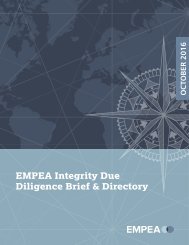You also want an ePaper? Increase the reach of your titles
YUMPU automatically turns print PDFs into web optimized ePapers that Google loves.
To some extent, policymakers also need to be aware that<br />
building regional financial centres may be a zero-sum game<br />
where a new centre might be seeking to compete with<br />
existing centres in providing some services to some <strong>of</strong> the<br />
possible users. It will not always be possible to create new<br />
centres simply on new activities.<br />
Yet, there are some fairly obvious prerequisites that can<br />
be identified for a new financial centre to be established.<br />
In today’s world, connectivity is vital. These include travel<br />
links to the outside world and in particular to other centres<br />
<strong>of</strong> commerce. They also include communication links that<br />
enable entities in that centre to have systems that are<br />
compatible with international markets. A certain critical<br />
mass <strong>of</strong> economic activity is generally also necessary.<br />
Beyond that, there is a need for quality infrastructure and<br />
welcoming living standards such that high calibre staff can<br />
be attracted. In today’s competitive world, companies are<br />
loathe to simply use financial inducements to move people<br />
to new locations. That being said, there are ways to attract<br />
foreign staff if attractive personal tax rates or high quality<br />
living standards can be provided. In certain cases, the<br />
employers will devise their own ways to attract staff. These<br />
can include bearing some <strong>of</strong> the burden <strong>of</strong> local taxes or<br />
providing assistance with local living costs or possibly cost<br />
<strong>of</strong> education for children.<br />
To be attractive to private companies, new centres should<br />
<strong>of</strong>fer a stable political environment, adequate regulation<br />
and an effective and functioning rule <strong>of</strong> law? In some cases<br />
favourable tax or financial incentives may be used to attract<br />
companies. Such policies were used in jurisdictions such as<br />
Ireland where very favourable tax treatment attracted many<br />
corporates and financial companies. Many administrative<br />
financial centres such as Cayman Islands and possibly<br />
Mauritius have used ‘tax neutrality’ 1 to attract certain types<br />
<strong>of</strong> activities to their country. However, in the past some<br />
centres also used less robust diligence and regulatory<br />
standards to attract business.<br />
Offshore centres have been criticised for being ‘tax havens’<br />
for permitting major international companies, or investment<br />
funds, to avoid paying taxes in countries in which they<br />
operate; or worse to be hosts to illegal activities such as<br />
money laundering. Tax evasion was typically enabled by<br />
secrecy and lack <strong>of</strong> disclosure. As a result, many donors<br />
that participate in funds or financial vehicles domiciled<br />
in such jurisdictions have sought out other locations for<br />
their activities or required higher standards <strong>of</strong> diligence<br />
and transparency.<br />
In summary, financial centres are much more than just<br />
domiciles <strong>of</strong> investment funds. In fact the most successful<br />
financial centres (e.g., New York and London) thrive without<br />
being the physical location <strong>of</strong> capital. Financial centres<br />
develop on the back <strong>of</strong> increasing commercial activity and<br />
business opportunities for providers <strong>of</strong> financial services.<br />
This will give rise to local firms and attract international firms<br />
if the opportunity is sufficiently attractive. For all successful<br />
centres this has been assisted by policymakers providing<br />
a conducive environment with the explicit goal <strong>of</strong> building<br />
a financial centre. Governments can engage proactively<br />
with the financial sector in raising finance or executing<br />
privatisations or other corporate finance transactions. This<br />
can catalyse broader activity in the economy. In many<br />
developing countries, donors can play a role in advocating<br />
the benefits <strong>of</strong> efficient capital markets in developing<br />
a stronger private sector. They can make targeted<br />
interventions using training to overcome skills gaps or more<br />
broadly they can help execute initiatives that allow local<br />
markets or local entities to engage with the international<br />
markets more effectively.<br />
We envisage that that we will see in Africa the development<br />
<strong>of</strong> a series <strong>of</strong> local financial centres as individual countries<br />
benefit from economic growth. However, there is the<br />
potential for a few larger financial centres that service not<br />
only the host country but also neighbouring countries and<br />
potentially play a role across the continent. Our hypothesis<br />
is that such centres are most likely to be in countries that<br />
have the highest levels <strong>of</strong> growth or highest levels <strong>of</strong><br />
GDP and where the host governments build an enabling<br />
environment. So centres such as Johannesburg, Lagos,<br />
Casablanca and Nairobi are the ones that come most readily<br />
to mind. Currently, Mauritius fills the role <strong>of</strong> Administrative<br />
centre for Africa. Whether these functions can be readily<br />
brought ‘onshore’ will depend on the ability <strong>of</strong> one or other<br />
centre to <strong>of</strong>fer a competitive environment and possibly<br />
some supportive policies from the host government. The<br />
possibility <strong>of</strong> turning Mauritius into a fully transparent<br />
financial centre that is aligned with the interests <strong>of</strong> donors<br />
ought to be considered as well.<br />
1<br />
No taxation for intermediating finance flows.<br />
<strong>Conduits</strong> <strong>of</strong> <strong>Capital</strong> – Onshore Financial Centres and Their Relevance to African Private Equity<br />
| 103





